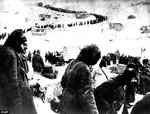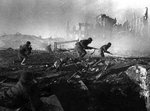parsifal
Colonel
February 2013 marks the 70th anniversary of the surrender of Axis forces in the encircled city of Stalingrad. It was one of the most important land battles of the second world war, and probably more than any other single battle sealed the fate of the Nazi regime.
It is a battle that even today has a measure of controversy. It was both a battle that helped preserve our democracy but at the same time ensured s decades long occupation of Eastern Europe and brutal suppression of human rights
View: https://www.youtube.com/watch?v=T1AC4wm6SwM
I think we should simply or at least acknowledge the terrible cost of that battle and is crucial important in shaping history.
It is a battle that even today has a measure of controversy. It was both a battle that helped preserve our democracy but at the same time ensured s decades long occupation of Eastern Europe and brutal suppression of human rights
View: https://www.youtube.com/watch?v=T1AC4wm6SwM
I think we should simply or at least acknowledge the terrible cost of that battle and is crucial important in shaping history.

 To the all the young men who left their souls on that battle field.
To the all the young men who left their souls on that battle field. ![article-2228373-15DD7250000005DC-981_634x477[1].jpg](/forum/data/attachments/201/201435-64b33a540d7ca003f30c6e0f9d1c5ea8.jpg)

